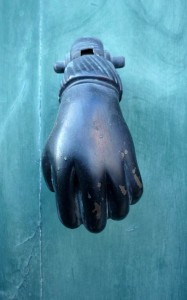18 November 2013
Knock, Knock, Knocking on Communication’s Door
Posted by Olivia Ambrogio
By John Calderazzo
Guest blogger John Calderazzo, a nonfiction writer and Colorado State University English professor, explains how rapping your knuckles on a table might teach you a crucial lesson about communicating science. This is the first in a series of posts from Professor Calderazzo on the subject of science communication; he will also lead a panel/workshop at Fall Meeting this year on Sharing Science in Plain English.
Knowledge is a great thing, right? It’s crucial to your science and scholarship. But when you try to talk about your work to non-experts and even to scientists in other fields, what you know can sometimes get in the way. So suggests a 1990 psychology experiment devised by a PhD. student at Stanford University—and described by Chip and Dan Heath in their excellent book Made To Stick: Why Some Ideas Survive and Others Die.
Elizabeth Newton gave 120 volunteers, or “Tappers,” a list of 25 well-known songs. Jingle Bells, the Star Spangled Banner, etc. Then she asked each to choose one and rap out its tune on a tabletop, to see if another volunteer, a “Listener,” could recognize it. No humming allowed.
Of 120 Listeners, only three got them right. That’s 2.5%. Interesting. But far more interesting was the fact that the Tappers had been asked ahead of time to predict how the Listeners would do. Fully half thought they’d nail it on the first try.
How could the Tappers have been so wrong?
When the Tappers chose their song, the entire musical kit—the words, the melody, maybe the voice of a friend or somebody famous singing it—became instantly embedded in their brain. Taking their knowledge for granted, they forgot that their Listeners did not know all those things, too.
Now, think of a climate scientist speaking at the public library and saying that melting polar ice results in positive feedback. At first, probably half the audience will think, “That must be good, as when my boss gives me positive feedback.” By the time they sort out the true message, that the melting will be made worse, the scientist is off on another topic. Good communication has bitten the dust. The Tapper has forgotten that the Listener doesn’t know the whole song, including the specialized language of climate science.
This is why it’s important to weed out or immediately define or explain jargon, acronyms, and certain other assumptions about your specialty when you speak with the public, the media, or across academic disciplines. Hyporheic zone sounds pretty cool tripping off the tongue of a hydrologist. But if she doesn’t tell a roomful of policy makers that this means the region beneath and alongside a stream bed where shallow groundwater and surface water mix, well, goodbye, message. And maybe goodbye, policy, too.
When it comes to communication, beware of what you know.
— John Calderazzo is Professor of English at Colorado State University and co-director of Changing Climates @ CSU.



 The Plainspoken Scientist is the science communication blog of AGU’s Sharing Science program. With this blog, we wish to showcase creative and effective science communication via multiple mediums and modes.
The Plainspoken Scientist is the science communication blog of AGU’s Sharing Science program. With this blog, we wish to showcase creative and effective science communication via multiple mediums and modes.
Great concise and helpful post! This gets into the importance of framing and how facts without a frame won’t stick, so oftentimes the most important thing to communicate to an audience is a “frame” — a story which provides an effective framework by which to understand the appropriate data. Well done, John.
Thatta boy John. Even your cousin with a 10th grade education understood what what you were communicating!